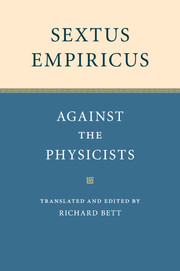Introduction
Published online by Cambridge University Press: 30 September 2021
Summary
LIFE AND WORKS
Sextus Empiricus stands near the end of a lengthy tradition of philosophers who called themselves, among other things, “sceptics” (skeptikoi, literally “inquirers”) and “Pyrrhonists” (after Pyrrho of Elis, from whom they claimed inspiration). For us, he is by far the most important member of that tradition, because he is the only one from whom we have substantial surviving writings. Given the extent of these writings, it is extraordinary how little we know about him as a person. Neither he nor anyone else tells us where he was born, or where he lived and worked. He is usually placed in the second century ce, but even this is far from certain, and attempts to pin down his dates more precisely have not found general acceptance. Aside from frequent references to himself and unnamed others as “we sceptics,” the only thing he clearly tells us about himself is that he was a medical practitioner (PH 2.238, M 1.260, M 11.47). It would seem from his title that he was a member of the Empiricist school of medicine, and Diogenes Laertius (9.116) confirms that this was so, calling him “Sextus the Empiricist”; we know the names of other Pyrrhonists who were also medical Empiricists, so this would not be particularly unusual. But here too, there is room for some doubt. Sextus actually talks about the relation between Pyrrhonist scepticism and medical Empiricism (PH 1.236–41), and seems to say that they are not as closely connected as some have claimed; indeed, he singles out another school, the Methodists, as being closer to scepticism than the Empiricists. Or at least, to some Empiricists; the passage can perhaps be read as criticizing one variety of Empiricism rather than the entire school. But he does not expand on the point, here or anywhere else in his surviving works, and a definitive resolution of the puzzles raised by this passage is not likely.
References in antiquity to Sextus individually, as opposed to the Pyrrhonist tradition in general, are in fact very scarce; not only his life, but also his writings seem to have gone largely unnoticed in intellectual circles.
- Type
- Chapter
- Information
- Sextus EmpiricusAgainst the Physicists, pp. vii - xxivPublisher: Cambridge University PressPrint publication year: 2012

